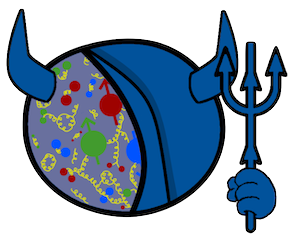Speaker
Description
Deeply virtual Compton scattering (DVCS) and deeply virtual meson production (DVMP) are well known to provide access to the generalised parton distributions (GPDs) of the nucleon. The COMPASS collaboration at CERN studied them in 2012, 2016 and 2017 using a 160 GeV $\mu^+$ and $\mu^-$ beam and a liquid hydrogen target. The beam was longitudinally polarised in opposite directions depending on the muon charge. The exclusivity of the reaction was ensured by a recoil proton detector, while the acceptance for photons from the DVCS or from $\pi^0$ decay was improved
adding a large-angle electromagnetic calorimeter to the COMPASS setup.
We will review the results for the DVCS cross-section and its $|t|$-dependence, which is mainly sensitive to the GPD $H$ and to the transverse extension of partons in the proton, the exclusive $\pi^0$ cross-section and the spin density matrix elements of exclusive vector mesons, which could both constrain in particular the chiral-odd (“transversity”) GPDs. We will also summarize the further prospects of the analysis of these unique data.

